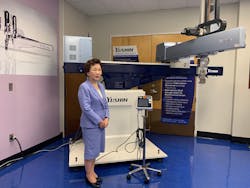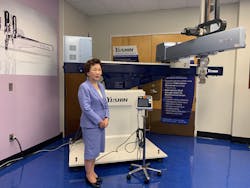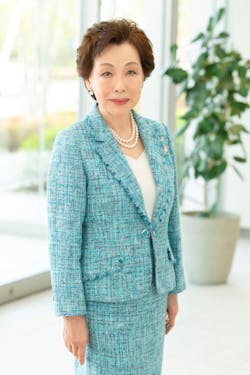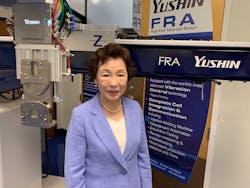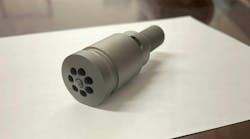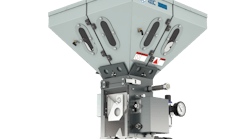Kotani’s late husband, Susumu, founded the company in 1973. Before being appointed president and CEO in the wake of her husband’s death in 2002, she had served as VP for almost 14 years. In an interview in September at Yushin America, the company’s North American office in Cranston, R.I., Kotani discussed innovations and objectives for the future with Plastics Machinery Magazine correspondent Pat Toensmeier.
What new, innovative and challenging technologies is Yushin working on?
Kotani: Through the years, Yushin has been an innovator. We were among the first to introduce servo motors and touch-screen controls to robots. In recent years, we collaborated with universities in Japan on optimized design techniques and through that fostered higher-speed operations and more energy-efficient machines.
Most recently, with our FRA take-out robot, we added IoT [Internet of Things] features and Yushin’s new Active Vibration Control technology.
How are these developments affecting injection molding?
Kotani: These technologies provide the benefits of higher speed and more energy-
efficient operations to our customers and help them improve productivity.
How fast are your latest models and how energy-efficient are they?
Kotani: Our FRA robot features an overall molding cycle time that is 10 percent shorter than on previous Yushin models. The take-out time is up to 29 percent faster. Take-out time, of course, varies widely depending on product. The FRA is also up to 34 percent more energy-efficient than some other Yushin robots.
The DRD III, a robot that we developed for optical disk molding, set a record time of 0.069 seconds to remove one disk from a mold.
What technologies do you incorporate into the robots to boost their performance?
Kotani: One method we’ve used with the FRA and a previous high-speed robot, the HSA, is addition of some carbon-fiber parts, which are lighter in weight than metal but still highly rigid compared to steel or aluminum. The collaborations we’ve had with Kyoto University on design-
optimization technology have influenced the shape of some of the robot components to make them lighter-weight but with high rigidity and strength.
The FRA won the 2019 Red Dot Product Design Award, a prestigious international award from Germany’s Design Zentrum Nordrhein. The FRA has also won three prizes in Japan, for new technology and machine design, in 2018, and for energy-efficiency this year.
In your recent annual report, you say that electric vehicles will use more plastics to reduce vehicle weight. How will growing demand for electric and autonomous vehicles affect Yushin?
Kotani: We don’t expect that electric and autonomous vehicle trends will change our philosophy of robot design. In terms of marketing, we will continue our sales efforts to customers who need lighter weight and more agile production in their robots and emphasize the ways in which our models achieve these benefits. We will continue to innovate and push for lighter-weight and more energy-efficient robots to increase productivity for our customers.
What features are you adding to boost IoT capabilities in robots?
Kotani: Yushin introduced IoT in July 2017 to our products with the FRA robot and Intu Line system. The IoT functions the Intu Line has and the capabilities it provides enable Yushin’s experts in Japan to remotely monitor robots in plants around the world so we can see their status and any trouble that might occur. If there is a mechanical or electrical issue that causes a robot to stop, remote monitoring can help solve the problem and achieve repairs quickly — sometimes even before we send out a technician. Other times, a technician arrives on a call armed with this knowledge, which makes an in-plant repair job easier. Another feature of the Intu Line is that it creates a log with a robot’s operating status that customers can access remotely. They can reference this historical data to more easily improve process operations and efficiency.
Kotani: One IoT feature we will keep improving is predictive maintenance, in order to shorten downtime or avoid trouble entirely with robots. Our goal is a future where robots have no unscheduled downtime because potential problems will be predicted beforehand and addressed.
Is the Intu Line capable of connecting the different process machinery in a molding cell or even throughout a plant?
Kotani: Typically, our customers have one robot in each production cell. By having the Intu Line on the robot in every cell they will gain the status and awareness of their entire molding operation. The Intu Line not only lets you see a robot’s status, but that of the molding machine and the auxiliary equipment linked to it. A molder can capture information from other equipment, see their status and operating history and generate a documentation record.
Sales and operating income were up in Yushin’s most recent fiscal year. What factors contributed to this result?
Kotani: Continuing growth in the take-out robot industry and in demand for customized automation systems.
The annual report also notes that custom equipment sales were up by almost 31 percent in fiscal 2019. What does this say about the markets you serve?
Kotani: This is a global trend that we see in demand for automated equipment. It’s across the board, not just in the American or Japanese market.
How does Yushin rank globally and in North America among robot suppliers?
Kotani: According to data generated by the Plastics Industry of America, we see that Yushin is a top shareholder in North America. It also holds the highest share in Japan. Overall, we pride ourselves in having the highest market share worldwide.
Do you have plans for expansion in North America? If so, what are they, and what do you hope to achieve?
Kotani: We have just introduced a robot called the MKA-2000S that will be sold exclusively in North America. It’s a large robot for large-part molding, and is targeted at the automotive, appliance and industrial construction markets. With it, we hope to grow our share in the large-robot market in North America.
There is a small but persistent chorus of calls worldwide to tax robots that take jobs from workers. How does Yushin respond to this?
Kotani: Our take-out robots free people from having to do menial and/or dangerous tasks. Business leaders also agree that using robots for certain types of work is more efficient than using people. Robots reduce the amount of energy needed for operations and increase productivity. We believe there will be growing demand for automation to take over menial, repetitive and dangerous tasks. We don’t anticipate facing threats from a robot tax.
What legacy do you want to leave behind as president of Yushin?
Kotani: Since its founding, Yushin has been an innovator in the industry. We were the first to introduce certain technologies to the industry, and we want to maintain that tradition to continue growing as a company. Our motto — “Attempting the impossible is the starting point for all new technology” — those were the words of our founder and first president, my husband. We want to continue to honor those words and keep them in our thoughts as our company philosophy and maintain that pioneering spirit as we move forward.
